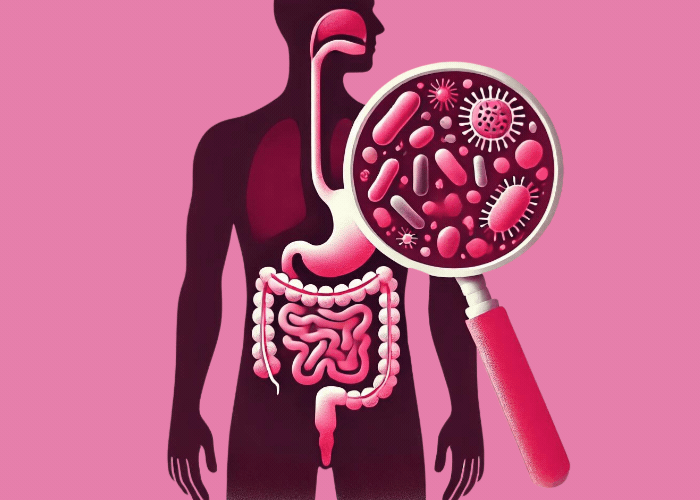What day is it? Where am I? And who is this person talking to me? These are just some of the many questions that patients with dementia can’t answer anymore because of their relentlessly progressing disease. 10% of women and 6% of men over that age of 65 are affected by progressive forgetfulness with Alzheimer’s dementia occurring more frequently with age. Science has already proven the close connection between the intestines and the brain – but what impact can the microbiome have on Alzheimer’s disease? Prof. Dr Dietmar Fuchs answers this and many other questions in the following interview.
bauchgefühl: Our society is getting increasingly older – and therefore, we can assume that more and more people will be affected by Alzheimer’s disease in the near future. Can you quickly tell our readers what this disease is all about?
Prof. Dr Dietmar Fuchs: Alzheimer’s dementia is a term for a constantly progressing brain disease in which the brain is literally “broken down“: The nerve cells in the brain are reduced – and therefore the patient’s mental abilities. In the beginning, this just appears to be mild forgetfulness. However, after many years of progressions, patients can even lose their spatial and temporal orientation and, in severe cases, not even recognise loved ones. Often, Alzheimer’s dementia and dementia are used as a synonym. However, we have to differentiate these two terms from one another: “Dementia” is the umbrella term for all diseases that are associated with a reduction in mental abilities and thus, interfere in the daily lives of the patients. Alzheimer’s dementia is the most common form of dementia, with roughly 60% of patients suffering only from Alzheimer’s dementia and about 20% suffering from a mixed form of dementia including Alzheimer’s dementia. Alzheimer’s disease typically affects people over the age of 65 – with the number of affected increasing drastically with age – and shows specific changes in the brain: Protein deposits create co-called plaques that accumulate on the outside of nerve cells and blood vessels in the brain. This limits nerve function as well as the oxygen and energy supply to the brain.
bauchgefühl: You have a doctorate in chemistry, and you’ve studied the immune system and the lab diagnostics of neurodegenerative diseases like Alzheimer’s dementia for 40 years. How does your research help us better understand Alzheimer’s disease?

Prof. Dr Dietmar Fuchs: The main symptoms, stages and progression of many neurological diseases – like Alzheimer’s dementia – are brilliantly documented. Even the causes for the progressive forgetfulness, i.e. structural changes to the brain, have been known for a while. Still, many scientists assume that the disease begins in the organ that shows these changes – in this case, that Alzheimer’s dementia starts in the brain. However, we didn’t look at the brains of patients with Alzheimer’s. Roughly 20 years ago we started looking at serum (note: the serum is the liquid part of the blood) in our lab diagnostics. We were interested in whether we could identify different biomarkers or parts of serum that are characteristically altered in Alzheimer patients. As it happens, we discovered that neopterin levels were elevated and that higher neopterin concentrations correlate with reduced cognitive performance. Neopterin is a transmitter molecule that is produced by certain cells in the immune system (e.g. scavenger cells or dendritic cells) and can stimulate inflammatory processes in the entire body. This realisation proved that an overactive immune system plays a role in Alzheimer’s dementia.
bauchgefühl: The intestines are famously an important centre for the immune system; they host 80% of the body’s immune cells and regulate our defence system in various ways. This leads to the assumption that increased inflammatory parameters could be attributed to changes in the microbiome and intestines. What other connections do you see between the intestines and Alzheimer’s dementia?
There could be processes outside of the brain that can cause serious changes to our bodies, and that play a role in the development or progression of Alzheimer’s disease.
Prof. Dr Dietmar Fuchs: We discovered many more interesting insights in our lab. For example, elevated neopterin levels, i.e. an overactive immune system, are associated with increased degradation of tryptophan. Tryptophan is an essential – i.e. vitally important for our bodies – amino acid that is converted into the transmitter molecules serotonin and melatonin by our nervous system. Patients with Alzheimer’s dementia have lower levels of serotonin in their brains which can be explained by the increased breakdown of its precursor molecule, tryptophan. This lack of tryptophan is due to the increased break-down of this amino acid during inflammatory processes. The body does this to prevent the proliferation of pathogens. These processes have been common knowledge in science for many years – however, our research group made a discovery that could point research and treatment of Alzheimer’s dementia in a new direction: We measured the levels of neopterin and tryptophan in the blood as well as the cerebrospinal fluid. The latter is also known as “liquor”. It surrounds the brain and the spinal cord and is the bodily fluid that is in direct contact with the diseased organ in Alzheimer’s dementia. We were able to show that neopterin and tryptophan are divided very unevenly between the two bodily fluids – yet, the concentration of both of these substances are higher in the blood than in the brain. This was the first important clue. There could be processes outside of the brain that can cause serious changes to our bodies, and that play a role in the development or progression of Alzheimer’s disease. The altered tryptophan levels already show that the intestines and the microbiome are key starting points: The human body can’t produce these essential amino acids on its own. That is why they have to be ingested through food and absorbed by the intestines – or produced by the intestinal bacteria. If the intestines don’t work properly or the composition of the microbiome is disturbed, it could have a significant impact on tryptophan levels.
Nevertheless, the role of the intestines and the microbiome could play a much larger role in the development and progression of Alzheimer’s disease: Starting with an altered intestinal flora and an impaired intestinal permeability (note: a.k.a. “Leaky Gut“), silent inflammations can arise in the intestines. These can develop into systemic inflammations and even play a role in the development of inflammatory processes in the brain. The inflammations that start in the intestines and spread throughout the entire body could also explain the overactive immune system – and offer a new therapeutic method by improving the intestinal flora with probiotics at the same time.
bauchgefühl: Together with Prof. Leblhuber, a renowned neurologist from Linz, you have already published several papers concerning Alzheimer’s dementia and the inspection of lab parameters outside of the brain. In one of the current studies, that was published in an internationally established journal for Alzheimer research, you examined what effect the use of probiotics could have on Alzheimer patients. What did you discover in your scientific work?
Prof. Dr. Dietmar Fuchs: We analysed biomarkers for immune activation in the stool of roughly 20 patients with Alzheimer’s dementia. More specifically, we analysed neopterin, tryptophan reduction, a marker for intestinal inflammation (zonulin) and the microbiome composition before and after a four-week intake of a special anti-inflammatory probiotic. After the probiotic treatment, we realised that the levels of zonulin dropped. Proof of a decrease in intestinal inflammations.
We could already imagine using probiotics to slow down the progression of forgetfulness and offer a new therapeutic option.
Even the tryptophan metabolism was positively influenced. We also documented an improved intestinal microbiome composition: There was a significant increase in Faecalibacterium prausnitzii, one of the most important anti-inflammatory intestinal bacteria. Our results over the last few years allow us to conclude that the composition of the microbiome is associated with the development and progression of Alzheimer’s disease. Of course, known factors such as genes and age will still play a significant role in Alzheimer’s dementia, but maybe there are additional criteria that make some people develop this disease earlier and faster than others. The scientific evidence from extensive studies for the exact relationship between the microbiome and dementia is still needed. Nevertheless, we could already imagine using probiotics to slow down the progression of forgetfulness and offer a new therapeutic option.
bauchgefühl: Thank you very much for these exciting insights!



























